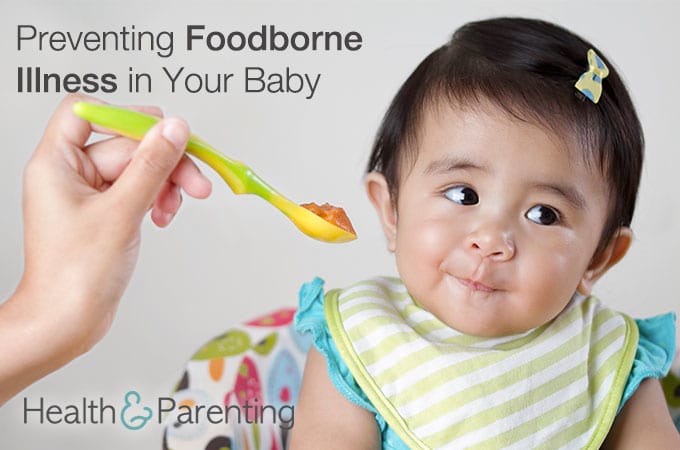When your baby started eating solid foods, you probably made sure to avoid giving her anything that she might choke on. But food safety also involves preventing foodborne illnesses that can make your baby sick.
Babies are especially vulnerable to foodborne illnesses and may get ill quicker than an adult. That’s because their immune system is still immature and not as developed to fight off contaminants. Also, it takes smaller amounts of bacteria to make your baby sick. When they do develop foodborne illnesses, babies often experience a higher rate of hospitalization than older kids and adults who get ill.
But by taking extra care when handling formula and food, you can help prevent your baby from getting sick. One of the most important steps you can take to prevent your baby from developing a foodborne illness is washing your hands before feeding your baby or handling her food. Although it seems like common sense, it’s easy to get busy and forget to take this simple step.
When it comes to food safety, there are several other things to keep in mind. For example, if you’re feeding your baby formula, don’t leave it out at room temp for more than two hours.
As far as solids go, check commercially packaged baby food before giving it to your baby to make sure it has not been contaminated. If you’re using baby food in a jar, make sure the safety lid on the jar “pops” when you open it.
Also, avoid feeding your baby directly from the jar of baby food and putting back leftovers. The food can become contaminated by the saliva from your baby’s mouth. Instead, place a portion of food in a dish and feed your baby from that. Don’t leave baby food out for longer than two hours. Bacteria can grow quickly at room temperature.
Opened baby food should only be stored in the refrigerator for no more than three days. If you’re not sure something is still fresh, err on the side of caution and throw it out.
You should also avoid giving your baby unpasteurized juices, which can carry bacteria. Honey is also a no-no for the first year since it can contain spores of a bacterium that causes botulism.
When you’re preparing food for your baby, always wash fruits and veggies before serving. Also, consider using a wooden cutting board. Studies have shown that it’s easier to remove bacteria from a wooden board than plastic.
Lastly, make sure all meat is cooked to a safe internal temperature by checking it with a meat thermometer. Red meat should be cooked to a minimum of 160 degrees Fahrenheit and poultry cooked to at least 180 degrees.
Written by MaryAnn DePietro @writerlady4
This information is not intended to replace the advice of a trained medical doctor. Health & Parenting Ltd disclaims any liability for the decisions you make based on this information, which is provided to you on a general information basis only and not as a substitute for personalized medical advice. All contents copyright © Health & Parenting Ltd 2016. All rights reserved.










